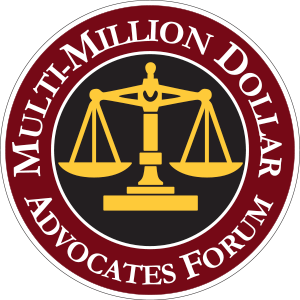The Insurance Information Institute cited that in the USA in 2019 there were 5,015 fatalities involving registered motorcycles on the roads. If you or a loved one have been involved in a serious motorcycle crash we want to help you. At Schiffer Law Firm, we know that according to the National Highway Traffic Safety Administration per vehicle miles travelled in 2019, motorcyclist fatalities occurred nearly 29 times more frequently than passenger car occupant fatalities in traffic crashes.
We understand that being involved in a motorcycle accident can be a traumatic experience, often resulting in severe injuries and significant financial burdens. Our team of experienced personal injury attorneys is here to guide you through the legal process and work tirelessly to ensure that you receive the compensation you deserve.
Motorcycle accidents in Texas can have devastating consequences, as riders are often more vulnerable to injuries due to the lack of protective barriers that other vehicles provide. Even if a rider is utilizing all the safety equipment available, without the safety features of a car or truck, motorcyclists face a higher risk of suffering severe injuries, such as broken bones, spinal cord injuries, traumatic brain injuries, road rash, and even fatalities. These injuries can have a profound impact on individuals and their families, leading to physical pain, emotional distress, and financial strain.
At Schiffer Law Firm, we are dedicated to protecting the rights of motorcycle accident victims. Our team has a deep understanding of the complexities involved in personal injury cases arising from motorcycle accidents. We have successfully represented countless clients across Texas, fighting for their rights and helping them obtain the compensation they deserve to cover medical expenses, lost wages, pain and suffering, and other related damages.
Our attorneys possess extensive knowledge of Texas motorcycle laws, insurance regulations, and the tactics insurance companies may employ to undervalue or deny your claim. We leverage this expertise to build strong cases aimed at proving liability and maximizing compensation for our clients. We are committed to conducting thorough investigations, collecting evidence, consulting with experts, and employing a strategic approach to negotiations or litigation to ensure the best possible outcome.
At Schiffer Law Firm, we understand that every motorcycle accident case is unique. We provide personalized attention and tailor our approach to meet the specific needs of each client. Our compassionate attorneys take the time to listen, understand your concerns, and keep you informed at every stage of the legal process. We are dedicated to advocating for your rights, providing sound legal guidance, and fighting for fair compensation on your behalf.
When you choose Schiffer Law Firm to handle your motorcycle accident case, you can expect a team of skilled attorneys who are not afraid to take your case to trial if necessary. We have a track record of success in the courtroom and a reputation for aggressive advocacy. Our goal is to ensure that you are fully compensated for your injuries and that the responsible parties are held accountable for their actions.
If you or a loved one has been involved in a motorcycle accident in Texas, don’t face the legal battle alone. Turn to Schiffer Law Firm for knowledgeable and compassionate representation. Contact us today to schedule a free consultation, during which we will assess your case, answer your questions, and explain your legal rights and options. Let us fight for you while you focus on your recovery.








Texas is known for its expansive roads and scenic highways, making it a popular destination for motorcycle enthusiasts. However, riding a motorcycle in Texas comes with its fair share of risks. Motorcycle accidents are unfortunately all too common in the Lone Star State, often resulting in serious injuries or even fatalities. In this comprehensive guide, we will delve into the various aspects of Texas motorcycle accidents, including their causes, unique challenges faced by motorcyclists, Texas motorcycle laws, steps to take after an accident, potential damages and compensation, determining liability, the role of an experienced attorney, and the statute of limitations for filing a lawsuit.
1. Driver negligence and inattentiveness:
Distracted driving, failure to yield the right of way, and violation of traffic laws are some of the primary causes of motorcycle accidents in Texas. Drivers often fail to pay attention to motorcycles on the road, leading to devastating accidents.
2. Hazardous road conditions:
Poorly maintained roads, debris or objects on the road, and construction zones can all pose significant dangers to motorcyclists. Uneven surfaces or loose gravel can cause a motorcycle to lose control, while construction zones may have unexpected hazards.
3. Vehicle defects or malfunctions:
Faulty brakes, defective tires, and malfunctioning lights or indicators can increase the risk of motorcycle accidents in Texas. Defective parts can cause a motorcyclist to lose control, leading to serious injuries.
1. Lack of visibility: Motorcycles are often not as visible as larger vehicles, making it difficult for drivers to spot them. This lack of visibility can result in drivers failing to yield the right of way or colliding with motorcycles when changing lanes.
2. Lack of protective barriers: Unlike cars or trucks, motorcycles lack protective barriers such as seat belts, airbags, and metal frames. As a result, motorcyclists are more vulnerable to severe injuries in the event of an accident.
3. Frequency of lane splitting and its legality: Lane splitting, the act of riding a motorcycle between two lanes of traffic, is a common practice among motorcyclists. While lane splitting is not explicitly illegal in Texas, there are no specific laws regulating or permitting it, making it a potentially dangerous practice.
1. Licensing requirements for motorcyclists: In Texas, motorcyclists must obtain a Class M driver’s license or a motorcycle endorsement on their regular driver’s license to legally ride a motorcycle.
2. Helmet laws and exemptions: Texas requires motorcyclists under the age of 21 to wear a helmet. Riders over the age of 21 can choose not to wear a helmet if they have completed a safety course or possess at least $10,000 in medical insurance coverage.
3. Insurance requirements and coverage options: Texas law mandates that all motorcyclists carry liability insurance. However, other types of coverage, such as uninsured/underinsured motorist coverage and comprehensive coverage, are highly recommended to protect motorcyclists in the event of an accident.
1. Ensure safety and seek medical attention: The first priority after a motorcycle accident is to ensure your safety and the safety of others involved. Seek immediate medical attention, even if you believe your injuries are minor, as some injuries may have delayed symptoms.
2. Document the accident scene and collect evidence: Take photographs and videos of the accident scene, including damage to vehicles and road conditions. Gather witness statements and obtain a copy of the police report. All of this evidence will be crucial when seeking compensation for your injuries.
3. Notify your insurance company and consult with an attorney: Report the accident to your insurance company, providing accurate and detailed information. After that, consult with an experienced motorcycle accident attorney who can guide you through the legal process and ensure your rights are protected.
4. Preserve evidence and keep track of medical expenses: Keep records of all medical treatment and expenses related to your injuries. This information will be essential when seeking compensation for medical bills and other damages.
Motorcycle accident victims may be entitled to compensation for various damages, including medical expenses, lost wages and future earning capacity, pain and suffering, property damage, and in certain cases, punitive damages as a result of gross negligence or intentional misconduct.
Determining liability in a motorcycle accident can be complex, as multiple parties may be at fault. Potential defendants in a motorcycle accident lawsuit can include negligent drivers, government entities responsible for road maintenance, and manufacturers of defective motorcycle parts. Texas follows a comparative negligence system, which means that your damages may be reduced if it is determined that you were partially at fault for the accident.
An experienced motorcycle accident attorney plays a vital role in protecting your rights and helping you navigate through the legal process. They will conduct a thorough investigation, gather evidence, negotiate with insurance companies, and if necessary, represent you in court. Their goal is to maximize your compensation and ensure that the responsible parties are held accountable for their actions.
It is crucial to understand the statute of limitations for filing a motorcycle accident lawsuit in Texas. Generally, you have two years from the date of the accident to file a lawsuit. However, there can be exceptions to this timeframe based on certain circumstances. Therefore, it is important to consult with an attorney as soon as possible to assess your case and ensure your rights are protected.
If you have been involved in a motorcycle accident in Texas, it is vital to have a comprehensive understanding of the legal aspects surrounding such incidents. By being aware of the common causes of motorcycle accidents, unique challenges faced by motorcyclists, Texas motorcycle laws, steps to take after an accident, potential damages and compensation, determining liability, the role of an experienced attorney, and the statute of limitations, you will be better prepared to protect your rights and seek the compensation you deserve. Contacting a knowledgeable and experienced motorcycle accident attorney will ensure that your case is handled with expertise and care, allowing you to focus on your recovery while they fight for your rights.
Contrary to popular belief motorcycle accidents are often caused not by negligence or dangerous riding on the motorcyclist’s behalf. In fact, according to the NHTSA, the majority of multi-vehicle motorcycle accidents happen because the driver in the passenger vehicle didn’t see the motorcyclist. Perhaps they didn’t check their blind spot or signal before changing lanes. Maybe they were distracted by the radio or their phone. There are any number of scenarios that involve negligence on the part of the driver of the passenger vehicle rather than the motorcyclist. The responsibility lies with the vehicle operator to be fully alert, aware of their surroundings and obeying all traffic laws.
According to the National Highway Traffic Safety Administration per vehicle miles travelled in 2019, motorcyclist fatalities occurred nearly 29 times more frequently than passenger car occupant fatalities in traffic crashes. These crashes are all too frequently caused by driver errors, with one of the most common those being failure to check blind spots. It is the driver’s responsibility to ensure they are aware of their vehicle’s blind spots in order to make sure there are no vehicles, including motorcycles they may have overlooked.
Houston motorcycle crashes can be caused by several commonly overlooked dangers. One of the most common is a dangerous roadway. Cracks in the road surface, potholes, unevenness, and undulations can all contribute to passenger vehicle drivers losing control and swerving, injuring or killing a motorcyclist. In these cases, it is the responsibility of the government department or entity responsible for building and maintaining the roadways to ensure these conditions do not occur in the first place.
Design flaws occur, manufacturing processes can fail, and maintenance can be neglected. Any or all of these factors are a recipe for disaster for the motorcyclist. They can cause the vehicle to wobble at high speeds, the motorcycle may not brake as quickly or the vehicle may simply fail causing catastrophic injury or even death.
“We are entrusted with our clients’ life-changing problems, and we value the trust they place in us. At the same time, we are human too. We understand what each client is going through. The pains, the burdens and the toll it takes on their livelihood and their families. We strive to be the best we can when our job is to help others when they are at their worst.”
Paul Schiffer – Trial Attorney
“We appreciate all of our clients, our supporters, and the individuals who trust us with their lives. If you find yourself in what seems to be a hopeless situation, call us. We are here to help you.”
Jacob Schiffer – Trial Attorney
You need someone you can trust in your corner after your motorcycle accident. Experience, track record and the knowledge, dedication and ability to face the hard cases front on are exactly what you need. At Schiffer Firm we are here to help you reach the resolution you need.
Time is of the essence and absolutely crucial to the success of the case. Insurance companies do not have your best interests at heart and will be gathering their evidence meticulously. Call our specialist motorcycle crash attorneys to bring their skills to bear and keep the insurance companies honest. Our intentional philosophy of not overloading ourselves with too heavy a case load means we can be forensically thorough in our investigations.
Injuries do not always make themselves apparent immediately after a motorcycle accident. Consult your physician and make sure you get a thorough appraisal of the extent of your injuries and anything that may affect you later on, or that has the potential to become a chronic condition as time goes by. From here our experienced motorcycle crash attorneys will ensure that you are compensated for your injuries now and into the future.
Not only are you grieving the loss of your loved one but you are also facing the costs of medical treatments, funerals and the sheer emotional weight of going through the logistics of dealing with settling the myriad of matters required when we lose someone we love. We can pursue a wrongful death case to help you cover these expenses and focus on your family and loved ones during the grieving process.